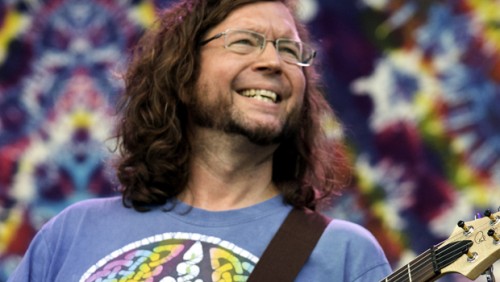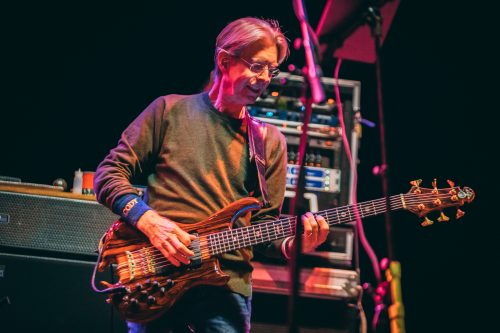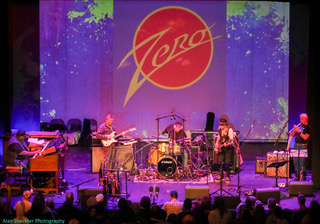By Michael Lello
Photo by J.C. Juanis
Locked in a lengthy bout of writer’s block, singer and guitarist John Kadlecik resorted to some less-than-traditional methods to get back on track.
“I finally resolved all the blocks and had a bit of an astrological reading,” he said, laughing.
Last summer, the astrologer “advised me that early 2014 was going to be a time to buckle down, and I sort of tied that in with another astrological event called Mercury Retrograde that happens three to four times a year, which usual advice is don’t sign contracts or start new business, but it’s a good time to finish old stuff,” he said.
With some help from the stars and the planets (and some well-known colleagues), Kadlecik, widely known as a member of Furthur — fronted by the Grateful Dead’s Phil Lesh and Bob Weir — and a former member of wildly popular Dead tribute Dark Star Orchestra, now has five new songs in his repertoire.
The new songs should figure into his John K Band setlist when he plays the River Street Jazz Café on Thursday, May 15.
A few years ago, Kadlecik spent a two-day writing session with Weir at the Dead/Furthur/Ratdog guitarist/vocalist’s TRI Studios, when some lyrics “turned up in Bob’s folder of lyrics,” he said. After Weir and Kadlecik worked up some tunes for Weir with lyrics by Dead lyricist Robert Hunter, “being the cool guy that he is, (Weir) said ‘Why don’t we pick one for you?,’” Kadlecik recalled.
Kadlecik’s first choice was “Desert Trance,” with lyrics penned by Indi Riverflow. The other new songs, he explained, include “Heart Highway,” with words by Kadlecik’s former Hairball Willie bandmate Eric Olson, and three other Riverflow tune, including “River Run,” with lyrics inspired by James Joyce’s “Finnegan’s Wake”; “Great Vehicle,” a “great road trip anthem”; “kind of an abstract discussion of both the mythical and astronomical Mercury, called ‘Liquid Silver’; and “The Good Friday Experiment,” which sprung from Kadlecik’s involvement in the soundtrack for a documentary film about Walter Pahnke, who worked with LSD guru Timothy Leary at Harvard.
While Kadlecik is known primarily for playing Grateful Dead material, he said that when it comes to the John K Band, he’s “not hung up on trying to present a 100 percent original show.” It’s more about continuing the essence of some of his previous projects, like The Mix, a band that was signed to a record deal, so he said you can expect a healthy blend of covers and originals.
Kadlecik’s journey to becoming one of the foremost interpreters of the Dead songbook was not a direct one. He started out “very passionately interested in classical violin and classical music at the age of 9,” he said, before getting bit by “the improvisational bug.” He taught himself guitar, “which has its own improvisational voice built into its own standard tuning, and stuff just started to open up right away.”
Like a lot of teenage guitarists, he became enamored of heavy metal and hard rock. “It was the ’80s, and shred rock was king,” he said with a laugh, noting that he “learned a lot of Ozzy Osborne but my own drives were more toward Led Zeppelin and Rush and Pink Floyd.”
He was drifting toward jazz by high school graduation, “and the Grateful Dead kind of came like a sort of halfway house on the way to jazz that I just got stuck in,” he said. “I’m not complaining.”
While he said playing Dead tunes was not meant to be a “bread-and-butter” gig – DSO was formed in Chicago with the intention of being a part-time band, not a nationally touring juggernaut – it has become just that.
As someone who went from playing the Jerry Garcia role in DSO to sharing stages with Weir and Lesh in Furthur, Kadlecik is uniquely qualified to speak about the Dead as both a fan and an insider. And he does so with eloquence and reverence.
“It doesn’t cover enough ground to say they were the American Rolling Stones,” Kadlecik said. “The Grateful Dead were the American electric folk group. They really synthesized the best of the whole world of music. It’s distinguishable from folk music. Grateful Dead music is destined to be its own genre, if it isn’t already.”
And it’s not easy to play, he added.
“Despite the relative ease and accessibility of a lot of the repertoire, as far as being able to perform it, to do it right takes the same skills as playing a jazz song.”
He also pointed to the influence of bluegrass and jazz on the Dead, noting “their deep obsession with a particular phase of the John Coltrane Quintet.” Weir, Kadlecik said, would repeatedly pick up the needle on a record player while listening to Coltrane albums in order to transpose pianist McCoy Tyner’s piano lines to his guitar work.
Kadlecik, who added that Mike Mizwinski will sit in with the John K Band at the Jazz Café, also took some time to list some of his favorite musical moments.
He listed his top three albums as “Revolver” by the Beatles, “From the Mars Hotel” by the Grateful Dead and “Blood on the Tracks” by Bob Dylan. The best concerts he’s attended were Ravi Shankar a few years ago in Charlottesville, Va., the Grateful Dead in Hamilton, Ontario, in 1990, and a Jean-Luc Ponty show in Virginia in 1995.




Leave a Reply